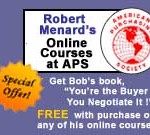
Robert Menard, Certified Purchasing Professional, Certified Professional Purchasing Consultant, Certified Green Purchasing Professional
This post cites the growing popularity of green purchasing education and training courses. As with other such courses, a free copy of You’re the Buyer – You Negotiate It will apply to all courses listed below. Just email me or the Society after you order and specify if you want the printed or ebook version.
Green Purchasing and Sustainability – Course 3400
Here is a brief synopsis.
The two-part self-running course titled “Green Purchasing and Sustainability” demonstrates how sustainability impacts our professions and how purchasing can take an active role in it. It will give practical and reasonable steps that purchasing can take to not only help its company become “greener” but to also do what purchasing does best, reduce costs. As more and more executive decisions include sustainability, buyers and purchasing managers need to learn how they can be part of the process before the policies and procedures are set in place. Sustainability is quickly developing and changing, and the sooner purchasing professionals begin to learn about the subject and current things that they can do to encourage and embrace it, the better position they will be in for the long-term future. Students will be taught what purchasing’s role is in sustainability, how to develop a green purchasing plan, how it can be included in facilities practices, how to utilize the 3Rs, energy savings ideas, and more. Similar to many of our other self-running online courses each part will take approximately 2 to 3 hours to complete. Students will receive a certificate of completion. This course is authored by Robert Menard, CPP, CPPC, CGPP, and CPPM. He is also the author of You’re the Buyer, You Negotiate It and the Society’s two part self-running course “The Science and Art of Negotiation”.
Here is a testimonial reference of Torrie Byrd, Purchasing Manager
DNC Parks & Resorts at Yosemite, Inc.
“I’m ecstatic that you and the American Purchasing Society realize the value of taking sustainability into consideration in the Purchasing role… there’s so much information packed into the materials. Our company developed a program years ago. I was a charter member of the original committee which saw the need for Purchasing to be involved in developing the program.”
Here is a testimonial reference of Randy Nice Purchasing/Sr. Project Manager for Consulting Services.
“I really enjoyed the course and learned many items that I had not taken the time to think about in further detail.”
This is from Nicholas Anderson, CPP, CGPP, Materials Manager, Pacific Research Laboratories, Inc
“I have now completed the two parts of the Green Purchasing and Sustainability, APS Course 3400. I found both courses provided a grounded framework on the key role that Purchaing can provide to the process of creating “green” sustainability. There were many good examples of how to estimate energy usage, identify areas in which the 3Rs could be applied and creating a “green” procurement plan that promotes companywide through supply chain sustainability practices/cost savings. I also appreciated the focus on CSR as an important element of defining sustainability as a crucial business best practice for potential growth and profitability.








